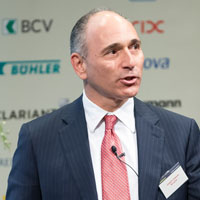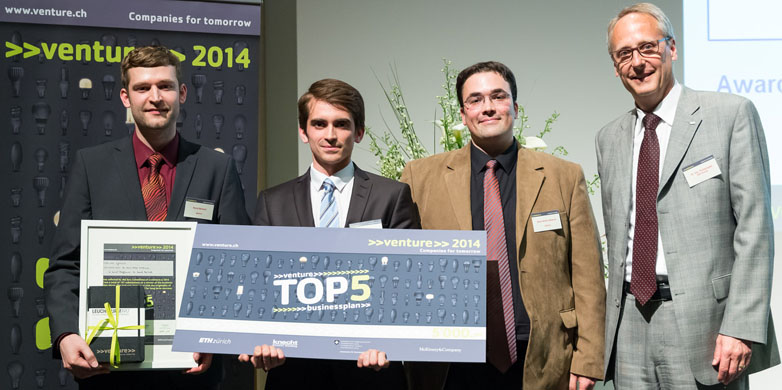The most promising start-ups
Ten companies were honoured on Wednesday as part of the Venture business plan competition at ETH Zurich, with prize winners including the two ETH start-ups rqmicro and Versantis. Novartis CEO Joseph Jimenez encouraged the young entrepreneurs to aim high.
The award ceremony of the Venture business plan competition must seem like an early Christmas present for investors. The vanguard of Swiss entrepreneurs presents its ideas here, many of which have the potential to change the world we live in – or at least parts of it – forever. SwissLeg, for example, aims to help wounded war veterans and handicapped people lead better lives and develops customised, high-quality leg prostheses that can be produced quickly and inexpensively. Gimball has developed a drone for complex environments that remains stable in the air even in the event of collisions. And Lunaphore is working on the next generation of tumour analysis and classification.
The jury, comprising experienced business professionals and investors, had the difficult task of selecting the ten most promising business plans from 141 entries. Two aspects stood out: first, six start-ups emerged from the life sciences field – the current research boom in biotechnology and medical technology seems to be bearing fruit in terms of innovative entrepreneurship. And second, eight entries came from the two Swiss Federal Institutes of Technology in Zurich and Lausanne.
Venture’s CHF 60,000 first prize was not won by a life sciences company, however, but by L.E.S.S. (Light Efficient SystemS), which emerged from a doctoral dissertation at EPFL. The two-man company has developed an ultra-thin light source that should soon replace the LEDs in our smartphone and tablet displays. It is as thin as a single strand of hair, requires much less energy and could pave the way to commercial flexible displays.
Fast detection and universal antidote
ETH Zurich was represented by two start-ups in the top ten: rqmicro (see ETH News), which took fifth place and received a cheque for CHF 5,000, has developed a method by which pathogens, such as Legionella, can be detected in water or food at record speed – what used to take up to three weeks takes just an hour with the new method. Hospital wards, for example, would no longer have to be evacuated and closed until the lab results were available if a Legionalla infection were suspected.
Versantis may have missed out on a top five placing with its universal antidote to poisoning, but the ETH colleagues were happy with their result nonetheless. “Before the Venture competition, we had a good idea. Now we have a solid business plan,” says founder Vincent Forster from the Institute for Pharmaceutical Sciences. “The past three months were intense and we've thought a lot about strategy, planning and organisation.” Thanks to the broad effectiveness of Versantis' innovative treatment, doctors treating a drug poisoning or overdose do not necessarily need to know which substance has been taken. The reduction in time may help save lives.
The four keys to innovation

Venture invited Novartis CEO Joseph Jimenez as the guest speaker and he gave the entrepreneurs a glimpse into how innovation is promoted at Novartis. Jimenez is convinced that “innovation is in our blood” – the key is to awaken it by providing the right conditions. He identified four driving forces: a focus on research with accordingly high investment. Novartis re-invests 16% of sales, or $ 9 billion a year, in research and development. It’s also important that business models are continuously refined and adjusted to changing market conditions. Moreover, it’s crucial to find the best people to bring an idea to fruition. Novartis doesn’t wait for top researchers to come to Basel but acquires them through its own research campuses; for example, in Massachusetts or Shanghai, where one such campus is currently under construction. It’s also important to stimulate employees’ creativity through the design of the workplace, says Jimenez. This is the idea behind the campus in Basel, which was designed by well-known architects and artists.
Jimenez was impressed by the assembled talent: “In this room tonight there are people who will change the world.” He concluded with a piece of advice based on his observations at Novartis: “The problem for entrepreneurs is not overly ambitious goals, but goals that are too easy to achieve.”

